
EQi 2.0 - Emotional Intelligence . . .
Emotional Intelligence is a set of emotional and social skills that influence the way we perceive and express ourselves, develop and maintain social relationships, cope with challenges, and use emotional information in an effective and meaningful way. The EQi 2.0 measures self-perception, self-expression, interpersonal skills, decision-making abilities, and stress management.
PDP's ProScan - Quick, Easy, Survey Tool . . .
A non-threatening, quick, easy, and reliable survey tool that is one of the most advanced instruments available. Statistical research of working adults enables the powerful ProScan Survey to produce reliable results to accurately assess a person's basic and preferred work styles. The survey examines combinations of specific traits that affect how the person works most effectively and reacts under stress. ProScan focuses on strengths and motivators to help employers create an environment that reduces employee stress while improving energy and morale.
The ProScan Report Measures: How a person functions most naturally, The role a person feels they need to play, How a person predictably comes across to others, Energy resources, Satisfaction index, Stress levels, Energy drain, Decision-making style, Myers-Briggs - Classic Pe
Myers-Briggs - Classic Personality Assessment Tools . . .
This is a classic among personality assessments. It’s been made more powerful with enhanced features that have made it easier to grasp and have increased its insightfulness, thus improving its ability to provoke thought.
CPI-260 - View Strengths and Developmental Opportunities . . .
The CPI instruments help people gain a clearer picture of their personal and work-related characteristics, motivations, and thinking styles, as well as how they manage themselves and deal with others, and provide a view into their strengths and developmental opportunities.
The CPI model helps individuals discover their orientations toward people and interpersonal experiences, toward rules and values, and toward their inner feelings. Participants’ results in these areas indicate which of four different ways of living or lifestyles best describe them and provide insight about how they see themselves and how they are seen by others.
